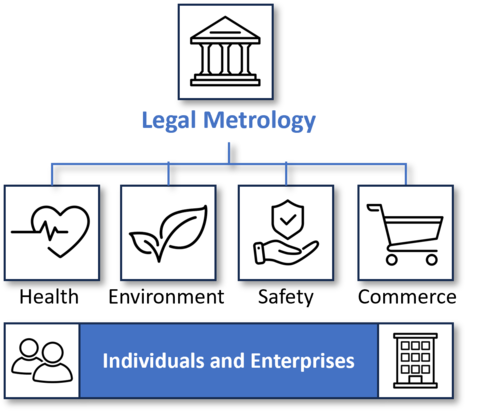What is Legal Metrology?

One of the more common inquiries that OWM receives is what the field of legal metrology is and how it differs from the Weights and Measures community of practice in the U.S.
The International Vocabulary of Terms in Legal Metrology (VIML) 2022 defines legal metrology as the "practice and process of applying statutory and regulatory structure and enforcement to metrology." In other words, legal metrology is the system of laws and regulations that regulate measuring instruments used for measurements that are subject to legal control such as trade and law enforcement. Legal metrology also ensures the accuracy and reliability of measurements that affect health, safety, or the transparency of commercial transactions. The system of legal metrology applied to commercial transactions in the U.S. is generally referred to as "weights and measures."

The wide scope of legal metrology includes protecting the interests of individuals and enterprises, but it also provides consumer protection, fraud control, reduction in transaction and dispute costs, and ultimately equity in the marketplace.
Is it Legal Metrology or Weights and Measures?

In the U.S., legal metrology is very closely related to the concept of weights and measures, which is the documentary standard infrastructure that specifies how technical artifacts and devices are to be used, together with the metrological performance criteria required, to test and verify regulated measuring instruments. Together, the systems of legal metrology and weights and measures promote uniformity in laws and regulations and ensure equity in trade and commerce. In other words, these underlying systems protect the general public from deceptive measurement-related practices and provide confidence in our day-to-day business and consumer-based activities, such as fueling up your electric vehicle at a public EV charging station.
One of the largest differences between legal metrology and weights and measures may also reside in a practical, laboratory realization of the SI with fundamental physical measurements (mass, length, and volume). Within the U.S. (i.e., states, territories, and local jurisdictions), this practice ties in with a State's weights and measures divisions but, in many cases, is separately managed as a distinct State laboratory metrology program. Please see the current directories of both the State Weights and Measures Directors and State Metrology Laboratories for more information regarding the state-by-state programs and organization.
To add to the complexity, this may be referred to as both legal metrology and weights and measures within the international metrology community. For example, the International Bureau of Weights and Measures (BIPM) and the International Bureau of Legal Metrology (BIML) work closely together to ensure that these concepts are realized in practice through both fundamental measurements and documentary standards that directly support global trade and commerce.
How is NIST OWM Involved?
A primary component of NIST OWM’s mission is to provide uniform legal metrology products and services to all states. However, the U.S. is unique in that its national-level office (i.e., OWM) does not maintain a national-level legal metrology system, nor is its function regulatory-based. Rather, the legal metrology products and services that OWM provides are voluntarily and individually adopted by the States and other local jurisdictions, which are then responsible for the day-to-day regulatory function of the U.S. Weights and Measures system.
OWM is active in legal metrology applied to commercial transactions. For example, this would include the regulated measuring instruments used in trade, such as grocery store scales, gasoline fuel pumps, and electric vehicle supply equipment (i.e., EV charging devices). OWM is also responsible for the legal metrology function for the U.S. via a diplomatic treaty with the international metrology community (see OIML). Likewise, our legal metrology function is directly aligned with NIST’s activities as the National Metrology Institute (NMI) for the U.S. to advance measurement science, standards, and technology and promote equitable standards worldwide, as well as our NIST mission to promote U.S. innovation and industrial competitiveness to enhance economic security.
Additional Resources
- Metrology Overview (NIST page)
- What is Legal Metrology? (OIML)
- Metrology in Short (EURAMET)
Contacts
-
General Information - OWM

